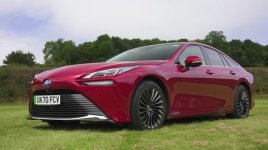The Toyota Mirai is a pioneering hydrogen fuel cell vehicle that combines advanced technology with a luxury sedan experience. Below is a comprehensive overview of its specifications and features:
1. Performance and Powertrain
Engine Type: Hydrogen Fuel Cell Electric Vehicle (FCEV)
Horsepower: 182 hp
Torque: 221 lb-ft
Transmission: Single-speed automatic
Drivetrain: Rear-Wheel Drive (RWD)

2. Dimensions and Capacity
Seating Capacity: 5 passengers
Exterior Dimensions:
Length: 195.8 inches
Width: 74.2 inches
Height: 57.9 inches
Wheelbase: 114.9 inches
Ground Clearance: 5.1 inches
Curb Weight: Approximately 4,255 lbs
3. Fuel Economy and Range
Fuel Economy:
XLE Trim: 76 MPGe city / 71 MPGe highway
Limited Trim: 67 MPGe city / 64 MPGe highway
Range:
XLE Trim: Up to 402 miles
Limited Trim: Up to 357 miles
4. Fueling and Consumption
Hydrogen Tank Capacity: Approximately 5.6 kg
Refueling Time: 3 to 5 minutes
Water Emission: The Mirai emits water vapor as a byproduct, which can be expelled using the "H2O" button, leading to the description that it 'urinates'.
5. Features and Equipment
Infotainment:
12.3-inch touchscreen display
Apple CarPlay and Android Auto integration
14-speaker JBL audio system
Safety:
Toyota Safety Sense™ 3.0 suite, including Pre-Collision System with Pedestrian Detection, Full-Speed Range Dynamic Radar Cruise Control, Lane Departure Alert with Steering Assist, and Lane Tracing Assist.
Tires and Wheels:
Standard 19-inch alloy wheels
Available 20-inch alloy wheels on higher trims
6. Pricing and Warranty
Starting MSRP: $50,190 for the XLE trim
Warranty:
3-year/36,000-mile basic warranty
8-year/100,000-mile warranty for fuel cell components
7. Pros and Cons
Pros:
Zero tailpipe emissions
Quick refueling time compared to battery electric vehicles
Luxurious interior with advanced technology
Cons:
Limited hydrogen refueling infrastructure, primarily in California
Higher initial cost compared to some conventional vehicles
8. Additional Information
Manufacturing: The Toyota Mirai is manufactured in Japan.
Towing Capacity: The Mirai is not rated for towing.
Climate Performance: Hydrogen fuel cell vehicles like the Mirai perform efficiently in various climates, but range can be affected by extreme temperatures.
Conclusion
The Toyota Mirai stands as a testament to Toyota's commitment to alternative fuel technologies, offering a blend of luxury, performance, and environmental consciousness. Its main limitation remains the sparse hydrogen refueling infrastructure, which potential buyers should consider.
For a visual review and more insights into the Toyota Mirai, you might find this video helpful:
1. Performance and Powertrain
Engine Type: Hydrogen Fuel Cell Electric Vehicle (FCEV)
Horsepower: 182 hp
Torque: 221 lb-ft
Transmission: Single-speed automatic
Drivetrain: Rear-Wheel Drive (RWD)

2. Dimensions and Capacity
Seating Capacity: 5 passengers
Exterior Dimensions:
Length: 195.8 inches
Width: 74.2 inches
Height: 57.9 inches
Wheelbase: 114.9 inches
Ground Clearance: 5.1 inches
Curb Weight: Approximately 4,255 lbs
3. Fuel Economy and Range
Fuel Economy:
XLE Trim: 76 MPGe city / 71 MPGe highway
Limited Trim: 67 MPGe city / 64 MPGe highway
Range:
XLE Trim: Up to 402 miles
Limited Trim: Up to 357 miles
4. Fueling and Consumption
Hydrogen Tank Capacity: Approximately 5.6 kg
Refueling Time: 3 to 5 minutes
Water Emission: The Mirai emits water vapor as a byproduct, which can be expelled using the "H2O" button, leading to the description that it 'urinates'.
5. Features and Equipment
Infotainment:
12.3-inch touchscreen display
Apple CarPlay and Android Auto integration
14-speaker JBL audio system
Safety:
Toyota Safety Sense™ 3.0 suite, including Pre-Collision System with Pedestrian Detection, Full-Speed Range Dynamic Radar Cruise Control, Lane Departure Alert with Steering Assist, and Lane Tracing Assist.
Tires and Wheels:
Standard 19-inch alloy wheels
Available 20-inch alloy wheels on higher trims
6. Pricing and Warranty
Starting MSRP: $50,190 for the XLE trim
Warranty:
3-year/36,000-mile basic warranty
8-year/100,000-mile warranty for fuel cell components
7. Pros and Cons
Pros:
Zero tailpipe emissions
Quick refueling time compared to battery electric vehicles
Luxurious interior with advanced technology
Cons:
Limited hydrogen refueling infrastructure, primarily in California
Higher initial cost compared to some conventional vehicles
8. Additional Information
Manufacturing: The Toyota Mirai is manufactured in Japan.
Towing Capacity: The Mirai is not rated for towing.
Climate Performance: Hydrogen fuel cell vehicles like the Mirai perform efficiently in various climates, but range can be affected by extreme temperatures.
Conclusion
The Toyota Mirai stands as a testament to Toyota's commitment to alternative fuel technologies, offering a blend of luxury, performance, and environmental consciousness. Its main limitation remains the sparse hydrogen refueling infrastructure, which potential buyers should consider.
For a visual review and more insights into the Toyota Mirai, you might find this video helpful:
